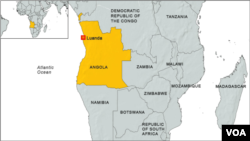A top Angolan security official is blaming opposition-allied protesters for sparking clashes in the capital last week that led soldiers to shoot dead a teenage boy and demolition crews to kill a toddler.
The opposition UNITA party swiftly condemned the statement, calling it a “blatant lie.”
The August 6 protest in the Zango neighborhood of the capital, Luanda, is part of a rising wave of opposition to the long-ruling MPLA party, which has ruled the Southern African nation since its independence from Portugal in 1975. The party has been accused, among other things, of enriching itself while the rest of the nation wallows in poverty.
Residents were holding a peaceful protest against plans to demolish their homes to make way for a new development, witnesses told rights groups. The authorities say homes were built in an area designated for a new airport.
Col. Silvano Ndongua told VOA's Portuguese service that UNITA militants had gone to the area twice ahead of the protest, “inciting hate among the population that attacked machinery with sticks, gasoline bombs and stones."
In an interview Wednesday, he said protesters fired on police before they fired back, and that three soldiers had been wounded. Residents said a one-year-old boy was killed when his home was demolished.
UNITA vice president Raul Danda dismissed Ndongua’s claim that the opposition prompted the violent response.
“Maybe they will start saying that it was UNITA that ordered the demolitions,” he told VOA.
Rights groups have repeatedly accused Angola’s government of being repressive and intolerant of dissent. In recent months, Human Rights Watch and other rights groups have raised the alarm over numerous cases in which they say security forces have killed or wounded protesters without justification.
The international rights group called for a thorough and impartial investigation.
“Angolan soldiers fired live ammunition during a peaceful protest and the unsurprising result is the death of a teenage boy,” said Daniel Bekele, Africa director at Human Rights Watch. “The authorities need to promptly investigate why the soldiers opened fire, prosecute those responsible for any wrongdoing, and take steps to avoid such bloodshed in the future.”
In a statement, the Angolan army said it started an investigation and has found two guns in the area.
The teenager’s name was Rufino Antonio. He was 14. His uncle told Human Rights Watch that he was playing with other children when the soldiers arrived. He joined the protest. When soldiers opened fire, another protester urged Rufino to take cover behind a mango tree.
It was there that he was hit in the neck by a bullet. By the time his parents arrived, he was already dead.
Rufino’s uncle said army officials then came and took his body away without explanation. The family only found his body the next day in a hospital morgue.






